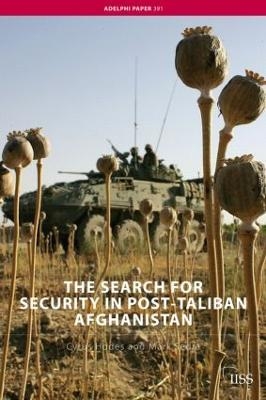
The Search for Security in Post-Taliban Afghanistan
Routledge (Verlag)
978-0-415-43883-4 (ISBN)
By the middle of 2007, Afghans had become increasingly disillusioned with a state-building process that had failed to deliver the peace dividend that they were promised. For many Afghans, the most noticeable change in their lives since the fall of the Taliban has been an acute deterioration in security conditions. Whether it is predatory warlords, the Taliban-led insurgency, the burgeoning narcotics trade or general criminality, the threats to the security and stability of Afghanistan are manifold. The response to those threats, both in terms of the international military intervention and the donor-supported process to rebuild the security architecture of the Afghan state, known as security-sector reform (SSR), has been largely insufficient to address the task at hand. NATO has struggled to find the troops and equipment it requires to complete its Afghan mission and the SSR process, from its outset, has been severely under-resourced and poorly directed. Compounding these problems, rampant corruption and factionalism in the Afghan government, particularly in the security institutions, have served as major impediments to reform and a driver of insecurity.
This paper charts the evolution of the security environment in Afghanistan since the fall of the Taliban, assessing both the causes of insecurity and the responses to them. Through this analysis, it offers some suggestions on how to tackle Afghanistan’s growing security crisis.
Cyrus Hodes is a consultant focusing on country and geopolitical risks. He first worked in Afghanistan in 1998 with the NGO Solidarités, and has worked there since 2001 as a consultant for the private sector, governments, think tanks and international organisations. His special interests include conflict-affected states, counter-terrorism and international security. He studied at Sciences Po Paris, and received an MA in Defence and Geostrategy from the University of Paris II and a MPA from the John F. Kennedy School of Government at Harvard. He is a Senior Fellow at the Center for Advanced Defense Studies in Washington DC, and has published various articles and book chapters on Afghanistan and the defence sector. Mark Sedra is a Research Assistant Professor in the Department of Political Science of the University of Waterloo and a Research Fellow at the Centre for International Governance Innovation (CIGI), both in Waterloo, Canada. His research focuses on post-conflict state-building, with an emphasis on the security sector, and he has published numerous editorials, journal articles, policy reports and book chapters on this area. He is also a PhD candidate in the Political Studies Department at the School of Oriental and African Studies (SOAS), University of London. His dissertation focuses on the challenges of rebuilding security structures in post-conflict societies, with Afghanistan and Iraq serving as his principal case studies.
Introduction Part 1: Threats to Security and Stability in Afghanistan 1. Warlordism 2. Spoiler Groups and the Anti-government Insurgency 3.The Opium Trade Part 2: Combating the Threats to Afghanistan’s Security 4. International Military Support 5. Security-Sector Reform Conclusion
| Erscheint lt. Verlag | 31.10.2007 |
|---|---|
| Reihe/Serie | Adelphi series |
| Verlagsort | London |
| Sprache | englisch |
| Maße | 156 x 234 mm |
| Gewicht | 220 g |
| Themenwelt | Geschichte ► Allgemeine Geschichte ► Zeitgeschichte |
| Geisteswissenschaften ► Geschichte ► Regional- / Ländergeschichte | |
| Geisteswissenschaften ► Philosophie ► Logik | |
| Sozialwissenschaften ► Politik / Verwaltung ► Europäische / Internationale Politik | |
| Sozialwissenschaften ► Soziologie ► Spezielle Soziologien | |
| ISBN-10 | 0-415-43883-7 / 0415438837 |
| ISBN-13 | 978-0-415-43883-4 / 9780415438834 |
| Zustand | Neuware |
| Informationen gemäß Produktsicherheitsverordnung (GPSR) | |
| Haben Sie eine Frage zum Produkt? |
aus dem Bereich


